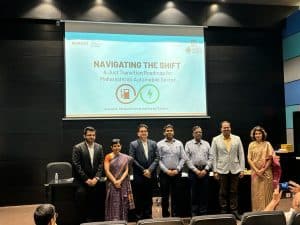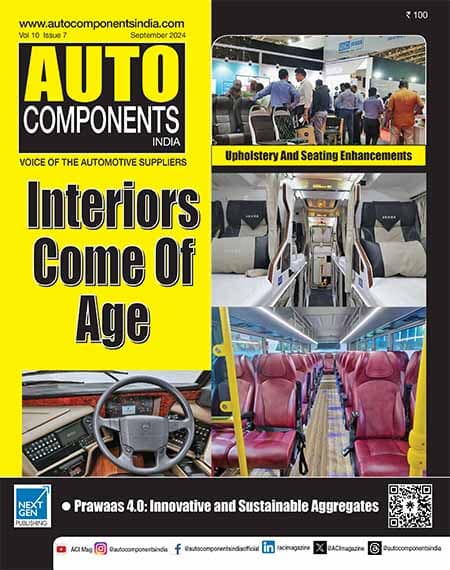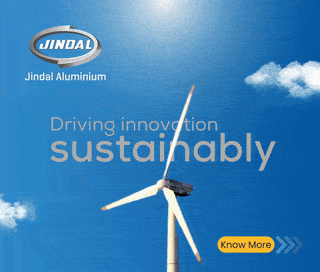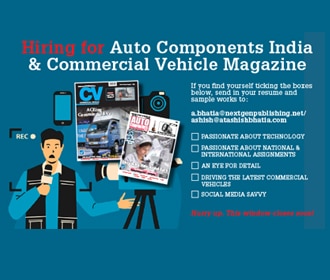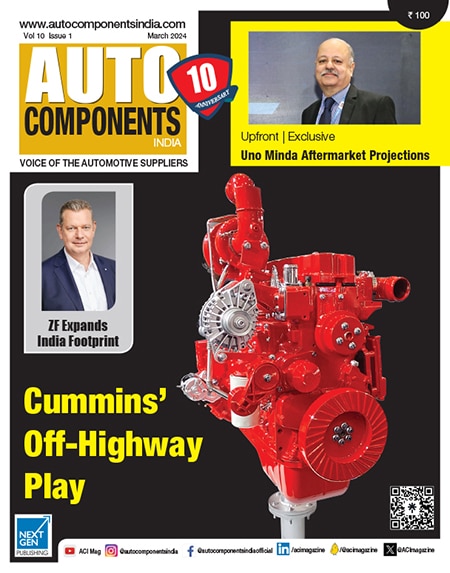Even as transition from internal combustion engine (ICE) vehicles to electric vehicles (EVs) presents India with a host of opportunities in the international market. It also poses severe challenges, as 45-84 per cent of the ICE vehicle parts, primarily powertrain components, are likely to become obsolete due to the EV transition. Thus, impacting the auto components manufacturers and the workforce in 6 districts of Maharashtra. These include – Pune, Nashik, Aurangabad, Mumbai (Suburban), Thane, and Kolhapur— accounting for 65 per cent of automobile units in the state and 83 per cent of the formal workforce.
The International Forum for Environment, Sustainability, and Technology (iFOREST), a prominent environmental think tank, released the first comprehensive study of the impacts of the EV transition on Maharashtra’s automobile businesses, workers, and the environment. Based on the prospective impacts. The report outlines a comprehensive roadmap for just transition of the automobile sector, which can deliver positive environmental and socio-economic outcomes.
According, to the report about 25 per cent of over 1,100 auto component manufacturers in the Pune cluster, will be highly or moderately impacted by the EV transition. These are enterprises producing parts for ICE powertrain sub-assemblies. With over 3.4 lakh workers formally engaged by the automobile and auto component manufacturers in the state. About 31 per cent of the job roles will be affected- 14 per cent will become obsolete and 17 per cent will require reskilling. Maximum job roles will be affected in the manufacturing segment. While traditional manufacturing jobs in ICE vehicles will be impacted by the transition to EVs, the overall impact on jobs will be positive.
The iFOREST reports were released at a public event in Pune which brought together various stakeholders, including eminent members of the civil society, Government officials, industry players, auto cluster representatives, skilling agencies, and thank tanks. While inaugurating the event, Dr. Raghunath Mashelkar, an eminent scientist and a Fellow of the Royal Society (honoured with Padma Vibhushan), said “Technology development, policy, and planning should happen together to channel resources in the right manner to support the transition”.
“The objective of the transition from ICE to EV should be aimed at achieving a holistic transformation. pune has the best institutes to innovate on technologies, and build knowledge. These should be collectively leveraged to boost green growth in the auto sector, increase employability and job opportunities in the new EV ecosystem, and ensure positive environmental outcomes,” Mashelkar added.
The report mentions, that the number of jobs per EV car is lower than the ICE car. However, due to massive EV penetration in the coming years, there will be a net increase in the number of jobs. India-level modelling by iFOREST shows that in passenger car manufacturing alone the number of jobs will double from 1.7 million in 2023-24 to 3.3-3.7 million in 2036-37. Dr. Ajit Ranade, Vice Chancellor of Gokhale Institute of Politics and Economics said, “EV transition is a trend, and thus we need policies and plans to make the transition right. It is essential to protect workers and not just jobs.”
The study also mentioned that 97 per cent of Micro, Small & Medium Enterprises (MSMEs), constitute ACMs, and remain vulnerable, given their limited financial resources and capacity for technology adoption. Prashant Girbane, Director General at Mahratta Chamber of Commerce, Industries & Agriculture (MCCIA) said “The Chamber of Commerce can support in skilling, technology, and strengthening particularly SMEs for just transition of the automobile sector”.
Proposed Solution in the Study
To make the EV transition a win-win in all respects, the report recommends a comprehensive Just Transition Framework for the Automobile Sector in Maharashtra, built on 4 Interrelated Pillars – Technology and skilling; Green manufacturing; Sustainable mobility choices; and Green energy and material circularity.
Considering the impacts, the iFOREST proposed a comprehensive ‘Just Transition Policy Framework for the Automobile Sector for Maharashtra’ highlighting key inter-related policy aspects. Some of the key policies include policies and investments to make Maharashtra an innovation hub in clean mobility. Fiscal policies to support OEMs and ACMs in adopting green manufacturing practices. Policies to strengthen skilling and reskilling measures aligned to the EV ecosystem. Developing a dedicated “Skill Development Fund” particularly to support informal workers, and low-skilled workers. Mandating the development of a Workforce Transition Plan by OEMs for strengthening enterprise-level action. Instituting a Right to Repair and Servicing Policy to reduce the vulnerability of workers engaged in servicing and repairing. To reduce the vulnerability of auto clusters and support a well-coordinated transition, a Cluster Plan will be essential for each auto cluster.
Speaking on the occasion Dr. Chandra Bhushan, CEO of iFOREST, said “Just transition of the automobile sector is a fundamental necessity as it provides a large number of jobs across the value chain. The advancement of technology and the development of human resources must progress together to ensure the availability of skilled human resources to fully leverage technological capabilities. Simultaneously, technology needs to be designed and implemented in ways that reduce job displacement and improve job prospects”.


